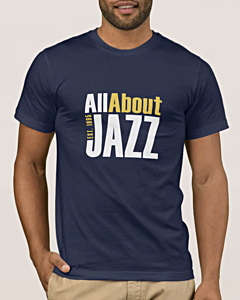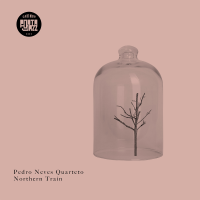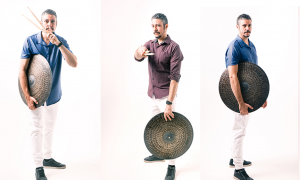Home » Jazz Articles » Interview » Ralph Alessi: Enjoying Musical Possibilities
Ralph Alessi: Enjoying Musical Possibilities
Improvisation is one of those loaded words. People have a different connection to that. But my connection is more of exploring the unknown. Going out on the ledge a little bit.
 Being a trumpet player in New York City can be a daunting occupation. The city is full of monster musicians and there is competition for gigs among bands, and among individuals. Jazz musicians are a tight community, but it's still a survival game.
Being a trumpet player in New York City can be a daunting occupation. The city is full of monster musicians and there is competition for gigs among bands, and among individuals. Jazz musicians are a tight community, but it's still a survival game. But Ralph Alessi, a Big Apple resident for about the last 15 years, is thriving — busy making music of his own, with his own bands, that is esoteric and invigorating, and landing gigs with other notable bands. His strong tone, fluid chops and eagerness to explore have endeared him to other musicians. So with all that, and his love of teaching, he is thriving. The city has chewed up many a musician, but Alessi — recently moved to Brooklyn — hopes to last in New York City for a long time.
Alessi is leading two bands at the moment, This Against That and Modular Theater, the latter which includes poet Will Jennings. He's also performed with the recent tour of Fred Hersch's well-regarded Leaves of Grass, which puts the words of Walt Whitman to music. (A CD of the same name documents that project). He's played with Ravi Coltrane, has done work with Don Byron and Uri Caine and finds a myriad of other things to get involved with since the San Francisco Bay area lad relocated to the East. And yet Alessi doesn't really think about playing "jazz." Just music.
"I understand when I'm playing music that's coming from that tradition (jazz) on some level. I don't like to think about things in styles. I generally like to just think of it as music. I know that's a cliché. But I really feel that," he says.
"When I listen to music on iTunes, I put it in shuffle mode. Everyone has their version of good music. It's subjective. I have my version of good music in there. I often put it in shuffle mode. After a while, I really don't hear a difference between Bird and James Brown or Stravinsky or Ornette (Coleman), whatever. I feel like I do a pretty good job of just hearing it as music. The stylistic wrappings are left to whomever. If people want to put it in those boxes, that's fine. But I try to hear it as just essentially what it is — vibrations and sound. And then noticing a similar theme throughout those different types of music, whether it's just dealing with rhythm or sound or composition. Hearing those things as that, rather than hearing it just funk. Those are just styles.
"I do like the opportunity to play in these different situations. Because it can be very challenging. I'd rather have it that way."
To Alessi, improvisation is "a spirit of exploration. Because improvisation is one of those loaded words. People have a different connection to that. But my connection is more of exploring the unknown. Going out on the ledge a little bit," and he hires musicians who think the same way.
Challenges, indeed, are vital to most free-thinking jazz musicians. For Alessi, growing on his instrument and growing as a musician and a writer is something he values. He's had his down times in the cyclical music business, but times are good now. Though he hasn't released a new album in a couple years, he'd like to so do this year and is eyeing various options.
 His last record as a leader, This Against That came out on Coltrane's RKM label, about the same time as Vice and Virtue, a duet, for the most part, with Shane Endsley. "I'm talking to a label right now about putting out a record. There's a Modular Theater record that's done. I just need to find a label that will put it out, or I'll just put it out myself. Then we'll put out a This Against That record. Hopefully both of those will come out this year. That's in the works right now... I really need to put at least one record out this year. I'm trying to finalize that."
His last record as a leader, This Against That came out on Coltrane's RKM label, about the same time as Vice and Virtue, a duet, for the most part, with Shane Endsley. "I'm talking to a label right now about putting out a record. There's a Modular Theater record that's done. I just need to find a label that will put it out, or I'll just put it out myself. Then we'll put out a This Against That record. Hopefully both of those will come out this year. That's in the works right now... I really need to put at least one record out this year. I'm trying to finalize that."
Alessi has played with all kinds of superb New York City musicians and in 1994, he appeared on Steve Coleman's Tale of Three Cities, the first of six Coleman recordings of which he was a part. Coleman remains a strong influence and an important collaborator. The 1995 release of Circa, by pianist Michael Cain, received critical acclaim and included Alessi's trumpet voice.
"The stronger musicians and the ones you've spent the most time with seem to be the most lasting in terms of influence. Steve Coleman, definitely. Uri Caine. I played with him a lot," Alessi says. "It's more about time. The more time you spend with someone that really has something unique as a musician that is going to stick... Definitely playing with Steve Coleman was a big breakthrough. Ravi Coltrane. Playing with Michael Cain led to some other things.
"I believe Uri Caine heard the Circa record. Playing with Fred (Hersch) also came from that record. It's a really nice record and I was fortunate to be a part of that. I have a few of my compositions on there. I know Fred heard that record several years ago. He got to a point where he wanted to start playing with more musicians and my name came to mind based on that recording. The same thing with Uri Caine as well. That was big.
"My time when I was teaching at Eastman, that was an influence. I did a week playing, talking about music and hanging," says the trumpeter. "Any time you play with someone, it can be just one experience. But if they are hitting mentally with you, it's a good experience."
Alessi started young on the trumpet, studying with his father Joseph when he was 6. he found jazz in high school. "I definitely had a hunger for it. The usual suspects. Early on, most players think more about their instrument, so they're listening to music with that in mind. I went through a serious Clifford Brown phase, a serious Freddie Hubbard phase, Miles Davis, Tom Harrell, Kenny Wheeler. Later on, others. Don Cherry. So many."
In the Bay Area, Alessi freelanced as a classical player, playing engagements with the San Francisco Symphony, opera and chamber orchestras. He attended the California Institute for the Arts, where he studied with Charlie Haden. He earned degrees in jazz trumpet performance and in jazz bass performance. Having his life touched by Haden, renowned for his work at CalArts in addition to his exceptional bass playing, had an impact.
"It was the basis for the way I teach, in a lot of ways. Charlie's approach is really pared down to the love of music, the love of playing, and then bringing that into the classroom. That goes a long way. Arguably, that's maybe THE way to teach, rather than talking about rules and not encouraging students to explore," Alessi explains. "He would just bring his enthusiasm into the classroom. He would always bring music with him to play for us that he was excited about. He'd say, 'check this out... check this out.' He would react naturally.

"I remember one time he played this Horace Silver solo on 'Lonely Woman,' and he was literally singing every note as he was listening to it. That's an important experience. It's easy in a school situation for students to lose their passion for it if they get bombarded with information. Charlie's way of teaching was exposing us to music and then just having us play all the time. Encouraging us. We had the opportunity to play with him and just to be next to that sound is an education in and of itself.
"It's more about improvisation. He would share a lot of anecdotes from his experience of playing with Ornette. Things Ornette talked about. It was a pretty valuable experience for all of us there, something you're not going to get in a school situation."
In New York, work with Coltrane became important in the late 1990s and in 2000, Alessi released his first recording as a leader, Hissy Fit.
These days, teaching — particularly as one of the instructors at the School for Improvisational Music — is a big part of Alessi's bag. "It's very near and dear to my heart," he says.
"Right now we're doing these isolated workshops. I think we've done our seventh at City College. The short-term goal is to put on these seminars. The long-term goal is to create a school that will be an option for students wanting to study jazz, improvised music. We're in the midst of dealing with that. We had a meeting charting out our plans for this year. In addition to doing workshops in August, we're going to do a benefit concert that will feature faculty, people that have been involved. The list will be drawn from people like Steve Coleman and Don Byron, Uri Caine, Ravi Coltrane. On and on. These are all people that have been participating in this. It's something I'm very excited about and something I feel is very, very important. It's about education, which is paramount to the existence of culture, really. I just feel like education often times misses the boat. So we're going forward with this idea.
"The idea is to get funding to promote this more and make it more available to students all over the world. We've had 100 students from North America, Europe, Australia... We started out at the Knitting Factory, then we moved to some other locations. Now we're doing it at City College.
Students from all over participate and stay in the city for a week while they are attending seminars conducted my notable musicians. "In a lot of ways that speaks to why we are doing it," says Alessi, "because a lot of these people fall outside the mold of what a teacher's supposed to be and the qualifications they're supposed to have. Our idea is that the people that are the most qualified are the people that have been doing it. They speak from experience.

"Not to say that if you don't have that type of experience you don't have anything to offer," he is quick to add. "I'm not saying that. But we feel like this is something that is easy to offer. It's easy to offer something we feel is the absolute best way to educate people wanting to choose this path. That's really what this is about. It's about teaching and encouraging people to get on this path if they're not on the path. That takes care of everything. Because once you're on the path it takes care of everything in terms of being a musician, being a human being. In my life, all of these experiences I've had with these people, you can see there is a common thread through all of them. A certain way of living your life, a certain way about thinking about life, a certain way about thinking about music. A passion for music and the idea that when someone uses the term 'playing' it's really about playing the way playing was when you were a child. Eternally young. That's the thing that's common to all of these people that have been part of this experience...
"There is something magical about this music and living this life. I think we're trying to talk about that, in addition to talking about fundamentals in music and also talking about the state of music nowadays. These types of things aren't really offered in music programs. They usually have a very codified, crystallized way of teaching jazz. Our thing is more liquid. We're trying to make the information as useful and as inspirational as possible to the students. It's a very, very important thing to me."
As for future projects, the versatile trumpeter says there are musicians he'd like to play with, like Ornette Coleman, Wayne Shorter and Bill Frisell. And he'd like more opportunities to write. "I feel very confident about my writing and I feel I should do a lot more. I just need to do it more. I would like to write for different configurations."
 Future recording ideas could take an interesting twist, as Alessi sees it. "I'm not really big on themes. But one would be '70s music. I feel very partial to pop music from the '70s. I would only do it if I could make it sound fresh and not make it sound trendy and a device. But some of my earliest memories about ('70s) music made me really excited and made me want to be a musician. That music remains that way. I feel like it would be a nice challenge and something to explore. And then the question would be, Could I get to something? That's the only reason to do it: to make some great music. That's a thought I've had. I don't know if I'll do it."
Future recording ideas could take an interesting twist, as Alessi sees it. "I'm not really big on themes. But one would be '70s music. I feel very partial to pop music from the '70s. I would only do it if I could make it sound fresh and not make it sound trendy and a device. But some of my earliest memories about ('70s) music made me really excited and made me want to be a musician. That music remains that way. I feel like it would be a nice challenge and something to explore. And then the question would be, Could I get to something? That's the only reason to do it: to make some great music. That's a thought I've had. I don't know if I'll do it."
Doing more with his classical music influences is also something that appeals to Alessi, which could include arranging some of the music, an important part of his musical upbringing, in an improvised setting.
"What people like Uri and Don Byron and Dave Douglas have done has really opened up new ways of dealing with classical music, where it doesn't sound like jazz meets classical. There really is a middle ground. I always want my music to be a middle ground. I don't want it to sound like: 'Oh. He's trying to do this type of thing here...' I just want it to all sound like music. I feel like they've done a very good job of doing that. And a lot of it is this generation of players now that went to music school and studied both classical and jazz. That's kind of a new thing. And you're seeing musicians that are really equipped to deal with it."
Tags
PREVIOUS / NEXT
Ralph Alessi Concerts
Support All About Jazz
 All About Jazz has been a pillar of jazz since 1995, championing it as an art form and, more importantly, supporting the musicians who make it. Our enduring commitment has made "AAJ" one of the most culturally important websites of its kind, read by hundreds of thousands of fans, musicians and industry figures every month.
All About Jazz has been a pillar of jazz since 1995, championing it as an art form and, more importantly, supporting the musicians who make it. Our enduring commitment has made "AAJ" one of the most culturally important websites of its kind, read by hundreds of thousands of fans, musicians and industry figures every month.























